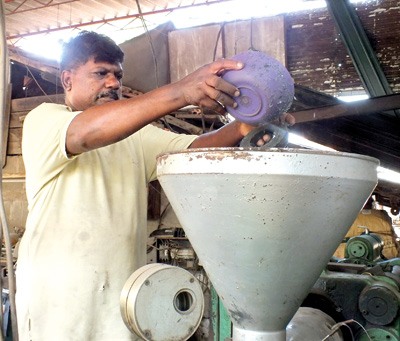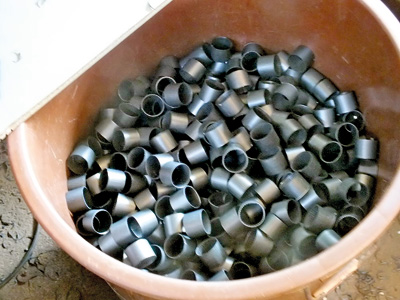Recycling waste plastic now a big cottage industry

Mr. Gerald Costa feeding the waste plastic into the crusher,
For whatever reasons, Sri Lanka is struggling to solve the issue of garbage while also tackling problems about plastic waste.
In the case of plastics Sri Lanka has banned single-use plastic products since January 2018 and some sectors using packaging material objected to the ban as plastic is essential in their industries.
However, elsewhere in the world the garbage problem is being tackled by recycling them to produce energy and organic fertiliser. Plastic recycling in Sri Lanka has now become, more and more a cottage industry, where not only is plastics important for this sector, but has been essential for living and some components made out of plastic are saving life – Heart Angioplasty Surgery (Stent).
It is quite amazing to learn that recycling the crushed and powdered plastic waste could earn more than Rs. 60,000 pure profit less all expenditure and mind you the space used for the machine is very small; the whole process is done in a space if not more than 15 ft by 10 ft.
Anthony Gerald Costa is an experienced welder, living close the NERD (National Engineering Research and Development) Centre, Ekala Ja-Ela. After his A Levels he started welding and continued for several years to join a company nearby and worked as a professional welder for more than 10 years.
Being one of the best welders and a machine maker he put up his welding shop in front of his house. Explaining his talent in turning out machines, he told the Business Times he could fit and make a railway compartment if necessary spare parts are provided.
The earnings from his welding work have been quite sufficient to spend on household expenses and even building his own house which was completed in 2000.
From about eight years ago, he also started plastic waste recycling which he could himself attend without any labour assistance. He produces only one item – around a one inch pipe like a bobbin which is used to roll price stickers around it.
More than 50,000 pieces are made and sold per month. As his supply is a standing order that could be completed very soon, he said: “I use my spare time when I do not attend plastic work for any welding work which could also provide more income”.

Finished plastic bobbins
He said that much more plastic items could be turned out, but it is difficult to find a demand for new items, adding: “We don’t get assistance from any state or other authority on how to find a market for their products”.
Their hard labour would definitely eliminate all waste plastics by recycling and to avoid this national menace, there must be some authority to assist them to market their new products. This could replace imported plastic items as on the one hand it would save foreign exchange and on the other they could help enhance their income.
Mr. Costa pointed out that in this sector itself there are many places that produce recycled plastic items and it has now become a widespread cottage industry throughout the country. “This cottage industry is growing,” he said.
The plastic recycling plant consists of two parts – the crusher and the moulder both combined together. He said once the recycled plastic powder is fed to the crusher it automatically runs through melting heat into the injection mounding machine and then out comes the finished product automatically.
They have to buy the crushed powder, but it is also possible for them to collect large waste plastic items and crush them so that a lot of money could be saved. For that a large space is needed. He said that the Ekala Industrial Estate, run by Industrial Development Board (IDB) has enough spare land. Mr. Costa said that he would be requesting the IDB to provide some land for crushing and to cut into pieces the large waste plastic items.
He is also capable of turning out machinery but Mr. Costa said that his next step is make products to replace imported items.


